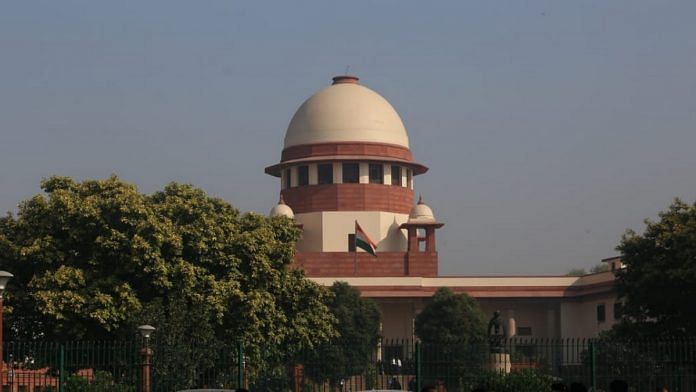New Delhi: Three months after the Supreme Court held that its five-judge bench can refer questions of law to a larger bench while hearing a review petition in the Sabarimala case, it has now issued a judgment listing down its reasons for doing so.
In this 24-page judgment, released Monday, the bench headed by Chief Justice S.A. Bobde asserted that there was no “fetter” on its discretion to refer questions of law to a larger bench.
“No matter is beyond the jurisdiction of a superior Court of record unless it is expressly shown to be so, under the provisions of the Constitution,” the bench also comprising Justices R Banumathi, Ashok Bhushan, L Nageswara Rao, M.M. Shantanagoudar, S.A. Nazeer, R Subhash Reddy, B.R. Gavai and Surya Kant observed.
The court ruled that being a superior court of record, it is for the court itself to decide whether any matter falls within its jurisdiction or not.
It observed, “In the absence of any express provision in the Constitution, this Court being a superior Court of record has jurisdiction in every matter and if there is any doubt, the Court has power to determine its jurisdiction.”
The bench also said the reference can be supported by Article 142 of the Constitution, which allows it to pass any order “necessary for doing complete justice”.
A five-judge bench of the Supreme Court had in September 2018 lifted the ban that prevented women and girls between the age of 10 and 50 years from entering the famous Ayyappa shrine in Sabarimala and held that the centuries-old Hindu religious practice was illegal and unconstitutional.
Several review petitions were filed following this judgment. While hearing the review petition, a five-judge bench, by a 3:2 majority had on 14 November last year, referred certain questions of law to a larger bench.
The nine-judge bench then ruled on 10 February that the five-judge bench could have made this reference while exercising its review jurisdiction. A month later, on 5 March, Chief Justice Bobde had said the nine-judge bench would start hearing the case from 16 March.
However, with the restricted court functioning and the nationwide lockdown, the case hasn’t been heard since.
Privacy judgment used as an example
The Supreme Court Monday also rejected the contention that “pure questions of law” cannot be referred to a larger bench.
It said this has been done before, referring to the case where an 11-judge bench was constituted to answer 11 questions of law on the interpretation of Article 30(1) (rights of minorities to establish and administer educational institutions) of the Constitution.
This reference had led to the landmark TMA Pai Foundation v State of Karnataka judgment.
Another such case was the one that led to the 2017 Right to Privacy judgment. In this case too, a three-judge bench of the court had referred to a five-judge bench the questions regarding existence of the fundamental right to privacy.
The court observed that the questions of law referred to the larger bench were of “utmost importance requiring an authoritative pronouncement by a larger bench”.
This, it said, was because of the five-judge bench highlighting the conflict between the court’s judgments in Commissioner Hindu Religious Endowments, Madras vs. Shri Lakshmindra Thritha Swaminar of Sri Shirur Mutt, and Durgah Committee, Ajmer vs. Syed Hussain Ali & Ors. The two cases pertain to the role of courts in matters involving essential religious practices.
Also read: Delhi election & Sabarimala: Why Article 25 is now caught between Constitution and religion



